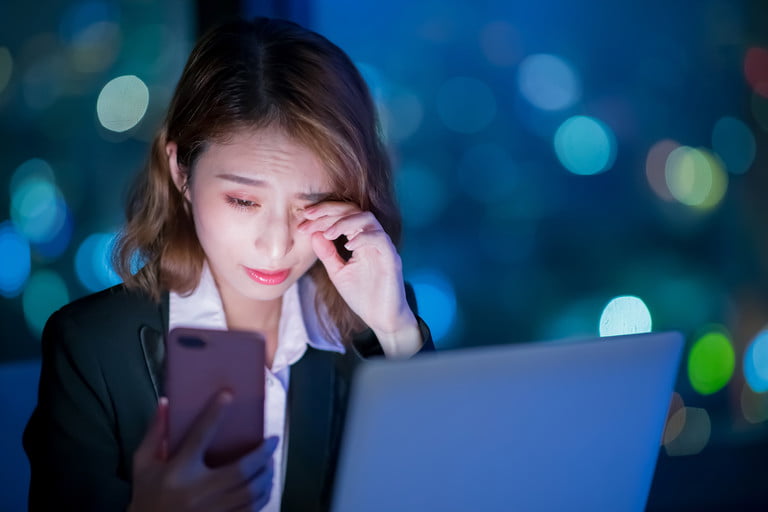Many of us have heard about the potentially harmful effects of blue light that comes from using electronic devices like our phones and laptops much of the day. In fact, Nielsen conducted a study in 2018 and found American adults spend more than 11 hours per day on their devices watching videos, responding to emails, reading articles, and scrolling through social media. It makes sense that there may be potential to harm our eyes in the process.
Given that today, most of us are even more dependent on our devices working from home during the pandemic, it’s being given more consideration. In fact, many ophthalmologists are recommending lens with blue light filters to help block us from harmful light. But is blue light bad?

Is blue light bad for your eyes?
Harvard researchers conducted a study in 2019 to see whether blue light can have damaging effects on our eyes. They found “the amount of blue light from electronic devices, including smartphones, tablets, LCD TVs, and laptop computers, is not harmful to the retina or any other part of the eye,” and doesn’t actually contribute to macular degeneration.
The reason, they found, was because the amount of light emitted from consumer electronics isn’t enough to be harmful. “Recent iPhones have a maximum brightness of around 625 candelas per square meter (cd/m2),” researched stated. “Brighter still, many retail stores have an ambient illumination twice as great. However, these sources pale in comparison to the sun, which yields an ambient illumination more than 10 times greater!” Being outdoors is where most of us get blue light exposure, however, we aren’t staring into the sun as we often do with our electronics.
The problem with blue light
The issue with blue light is that it passes through the cornea and lens all the way back to the retina. “The fact that blue light penetrates all the way to the retina (the inner lining of the back of the eye) is important,” say experts, “because laboratory studies have shown that too much exposure to blue light can damage light-sensitive cells in the retina. This causes changes that resemble those of macular degeneration, which can lead to permanent vision loss.”
The jury is still out on how much blue light is “too much,” so there are varying opinions as to whether people should take preventative measures to protect our eyes.

Protection is available
For those concerned or feel like they have significant eye strain or discomfort after staring at your screens all day, there are preventative measures you can take. Blue light filters are available on many smartphones and laptops and are built into the devices themselves. Others can be purchased wherever you bought your device. These can help reduce the amount of blue light without impacting your visibility.
As mentioned above, some doctors are recommending blue light-lens for your computer glasses as a way to reduce blue light exposure. Anti-reflective coatings are another option that can filter out blue light as well. As with anything, talk to your eye doctor about the options first to know which is best for you and what the potential cost will be to add this to your prescription.
Blue light is all around us and is transmitted by the sun, fluorescent and incandescent light bulbs, and other sources. It’s nothing new, but the fact that we spend so much time staring at our screens makes it a subject worth discussing.
A 2020 study published in the Indian Journal of Ophthalmology found that during COVID-19 lockdowns, “32.4 percent of the study population used a blue-light-emitting device 9 to 11 hours a day. Another 15.5 percent used the devices 12 to 14 hours a day,” due to working from home. Add to that the fact that kids who are distance learning from laptops and other devices instead of looking at a teacher are being exposed to blue light at a much greater rate, and it becomes a cause for concern.
Luckily, it seems the experts agree that blue light in and of itself isn’t a major worry. If you do have concerns or have a history of eye-related illnesses in your family, speak to your doctor and find out options that may work for you as protection. It’s better to be safe than sorry.




